Innovations by the Faculty in Teaching and Learning
GOALS:
In order to improve students’ teaching experience aside from traditional classroom teaching, the department uses novel concepts and their subsequent execution by means of quantifiable programs with the following goals:
The department will continuously strive to:
- Enrich student learning by innovative practices.
- Develop students’ comprehension and expertise of creative methods and strategies.
- Broaden students’ perspective of emerging technologies and tools in academics, and
contemporary and social issues by innovative strategies. - Motivate students to innovatively think, formulate and perform through different club activities.
List of initiatives in teaching and learning process followed by the department:
Each and every faculty use innovative practices, knowingly or unknowingly to enhance the teaching learning experience of every student and make understand the concepts throughout the year. Some initiatives may be so small to escape attention, and might be difficult to quantify and record; but may affect the learning of students in a subtle but important way. On the other hand, some initiatives might be so impactful so as to be clearly visible as making huge strides in improving the teaching-learning process.
Given below is a listing of some of the noticeable initiatives taken by the faculty of the department. However, it should not be considered as a conclusive list; but as a part of an open ended process of continuous improvement.
- Student Chapter activities: The depertment has following professional chapters which provides a good platform for the students to take active part in the various competions, seminars and levctures arranged by the society. The activities help the students to showcase their talents in terms for team buiding, communications skills, team work, target work and overall development in professional activities. One faculty advisor is associated with each student chapter for mentoring, guidance and overall governance.
- SAEINDIA collegiate club
- ISHERE club
- IMechE Student Chapter
- Fluid Power Society of India Club
- Institution of Engineers Club
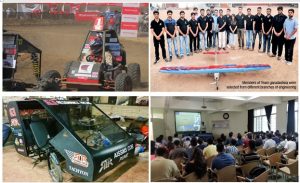
Outcomes:
- Students get exposure to design and build an off-road vehicle that will survive severe punishment of rough terrain and in some competitions, water, and compete at national/internations level under the guidance of faculty advisor.
- As in real work situations, these future engineers work together as a team to discover and resolve technical challenges in design, test, and manufacturing, as well as business issues.
- Enhancement of presentation skills and learning by participation in various events organized by student chapeters at various levels.
2.Virtual labs: In certain labs like the dynamics of machinery lab, some relevant experiments are conducted online on web browsers with the help of simulators. Such online facilities are called as virtual labs (http://www.vlab.co.in/), and are a part of an excellent innovative initiative taken by the MHRD of India.
Outcomes :
- Remote-access to simulation-based Labs in various disciplines of Science and Engineering.
- Use of virtual labs enthuse students to conduct experiments by arousing their curiosity. This would help them in learning basic and advanced concepts through remote experimentation.
- It provides a complete Learning Management System around the Virtual Labs where the students/ teachers can avail the various tools for learning, including additional web-resources, video-lectures, animated demonstrations and self-evaluation.
3.Use of Working models/Animations/ Mini projects/PPTs/Charts/ CASE
studies : In many relevant subjects, faculty encourage the students to make
miniature working models of mechanisms and machine components. The faculty members also
make use of cut sections as well as working models to enhance interest and level of
learning.
- The department also has cut section of the engine parts which helps students to understand the concept in a better way. Some faculty members develop models as well as mini projects with the help of students. All the classrooms are well-equipped with high quality projectors ready for use any time.
- Each faculty has prepared powerpoint presentations which were extensively used in pandemic period for online teaching and learning. The extensive use of charts, animations and Case studies help the students to understand the concepts in easier way.
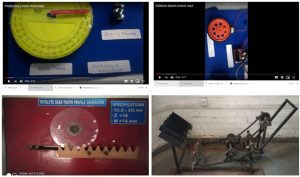

Outcomes :
- Working models and miniprojects enhances systems thinking abilities of the students. Models and model development are useful for helping students learn quantitative skills such as working, graphical analysis,visualization; and computational skills.
- Animations, Charts and Case studies help students to understand and grasp the concept easily.
4. Online teaching and learning resources on Microsoft Teams/ Google Classrooms: Faculty frequently upload notes, presentations, assignments, videos, and test results on
various virtual platforms. This significantly boosts the out-of- class learning experience of students.
 Outcome :
Outcome :
- During the pandemic period, this methodology has helped students to interact and learn the subjects effectively.
- The platforms helped the students to get the study material, interact with the faculty, solve and submit assignments and enhance their thinking ability through the tests as well as quiz sessions conducted by almost every faculty member.
5. E content on YouTube: Faculty have also created their own YouTube
Channels and Google drives wherein they upload study material relevant to their own
subjects. The links are shared with the students and the contents are openly
accessed by all students.
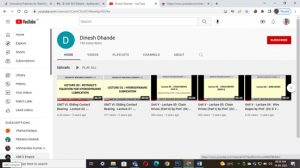
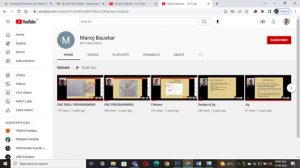
platform
Some sample video lectures can be accessed by using following links:
Links: https://www.youtube.com/channel/UCxeUCDx2FjYWeeekpV6lU4w?app=desktop
https://www.youtube.com/channel/UCvtndEl2ng9KVxWbxr2L4Ag?app=desktop
Outcome :
- This has helped students to learn and understand the course in a better and effective way.
- The students can learn at their own pace and at own convenience apart from classroom learning. This provides students, the opportunity for self study.
6. Classroom quiz sessions: These help in creating interest by breaking monotony of regular classes while enhancing the learning experience.
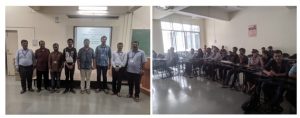
8. Project-Based Learning: PBL has been introduced for SE students with the goal of arn by working cooperatively in groups to solve a problem. PBL is a student-centered pedagogy that employs a dynamic classroom approach in which students are believed to gain a deeper understanding through active exploration of real-world challenges and problems. Students gain knowledge about a subject by investigating and responding to a complex question, challenge, or problem over time. It is an inquiry-based and active learning style. Problem-based learning will also alter the role of the teacher as a mentor in the learning process.
Outcome :
- PBL encourages students to develop a balanced, diverse approach to solving real-world problems, both on their own and in a team.
9. Students Symposium:
The department conducts Engineering Today (MECHPULSE), an annual national level student symposium, in the month of september every year to encourage the students organizing and participating in various events to enhance their skills. The institute also conducts science exhibition where the testing facilities and projects are exhibited to SE and TE students as well as students invited from nearby schools.


Outcome :
- Students get opportunity to enhance their technical skills by participating and competing in various technical events.
10.Cutting-edge initiative: Today’s education system is rapidly evolving in order to introduce new teaching techniques and strategies that promote a culture of diversity and inclusion. Similarly, each teacher has a distinct teaching style. However, all teachers have the same goal: to instil a love of learning in their students. Department have a few Cutting- edge initiatives as given below that use modern
technology
- Avishkar
- Hackathon
- Ideathon
- National innovation context
- Startup & Innovation cell
 Outcome :
Outcome :
- Students get exposure to discover and develop their entrepreneurial skills, project
ideas at national level. - Students get opportunity to present their research projects.